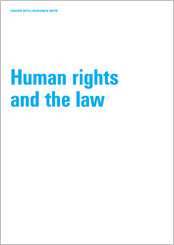Documents
Human rights and the law
14 November 2014
Responses to the HIV epidemics are strengthened by investing in enabling legal and social environments and by promoting and protecting human rights related to HIV. This ensures that resources for HIV reach the people who need them the most, empowers individuals to be proactive in taking care of their HIV-related health and human rights needs, increases the demand for services and improves the quality of services. HIV-related human rights issues—such as stigma and discrimination; punitive laws, policies and practices; and poor access to justice—have been identified by most countries as obstacles to achieving universal access to HIV prevention, treatment, care and support. Promoting and protecting human rights creates the optimal conditions for the delivery and uptake of essential HIV prevention, treatment and care services resulting in more efficient, effective and sustainable HIV responses.

